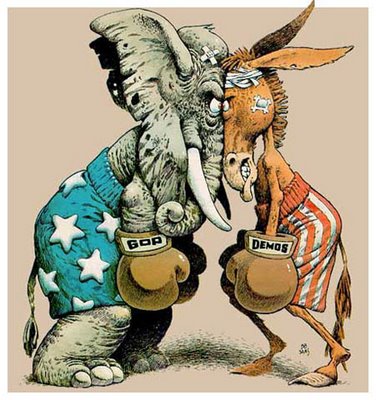
These eight rules (and my title) are from a post by Chris Bowers at mydd.com. They're very similar to some ideas I've been working on, so I thought I'd throw them out for discussion. There's a lot of wisdom here. My own political and philosophical journey parallels Chris', and we've reached many of the same conclusions:
1. The Democratic Party is the primary vessel of the progressive coalition. It is impossible to enact real change without an electoral apparatus within your movement. In a two-party system, it is thus necessary to adopt one of the two parties as the electoral vessel of your coalition.
2. Within the coalition, intra-party democracy must always be adhered to. All party nominees must be determined by an elective primary open to all registered members of the party in the relevant district. The winner of the primary must always be supported by all members of the party apparatus, and all rank and file members should vote for the nominee (especially those who voted in the primary).
3. Party elections should be fair and open to all members of the party, and no one should ever be forced or muscled off of a ballot for a party office or nomination for public office.
4. There are no litmus tests to join the coalition. No one has to read or sign off on any document stating support for a particular policy. If someone wants to join, registering as a Democrat should be the only requirement.
5. Under no circumstances should any member of the party apparatus support any member of any opposing coalition, (in other words, any other political party).
6. Outside of issues relating to corruption, Democrats must never criticize each other in the same manner that Republicans criticize Democrats.
7. No Democrat should ever publicly call any Democrat unelectable, or publicly rank candidates based on perceived electability.
8. Don't expect the party to change on it's own. Be prepared and willing to change it yourself.
I fully agree with number one. From a historical and practical standpoint third parties are not a viable route to political power. They serve an important and necessary role in our democracy, but they can't succeed electorally except in very limited circumstances. If you want to make a real difference in politics you need to be involved in a major party.
Party elections and primaries should be open, as per rules two and three, but I have some real reservations about the idea that all party members must support the party's nominee under all circumstances, as stated in rule five. You don't give up your brain or your morals when you join a political party.
Political or philosophical litmus tests are usually used simply to preserve the power of the establishment, and can strangle a party, so I like rule four.
Rules six and seven forbid criticism of your own candidates, and although that may make sense from a strictly pragmatic standpoint, I think Chris draws this a bit too broadly in a couple of ways. First, he needs to distinguish criticism intended to be kept within the party from that intended for public consumption. For example, in 2004 I severely criticized John Kerry to other Democrats, but I also put on my smiley face and did hundreds of doors for him. My reservations about Kerry were far less important than my desire to get rid of Bush.
There are also instances where a party's candidate may damage the party's other candidates or even the party itself. I'm not going to keep my mouth shut in cases like that.
Rule number eight. If you know me, you know that this is one I preach all the time. It bugs the hell out of me when people sit around and complain that the Democratic Party is evil or useless, yet refuse to get involved and work to change it. But these same people claim to believe in democracy and the power of the people to change the world.
The Democratic Party (at least in Wisconsin) is a pure democracy with a ten dollar admission fee. Anybody can become a member, and every member gets to vote and can run for party office. I'm the poster child for this; an outside reformer/agitator who ran against an establishment candidate to be a vice chair in my county party ... and won convincingly. It can be done. All it takes are good people willing to do it.
So, what do you think?

No comments:
Post a Comment